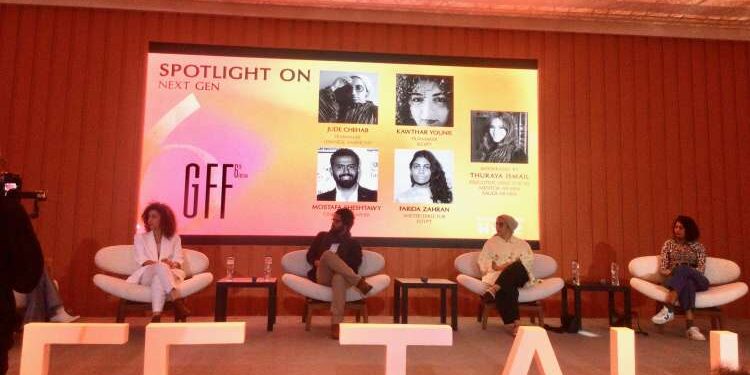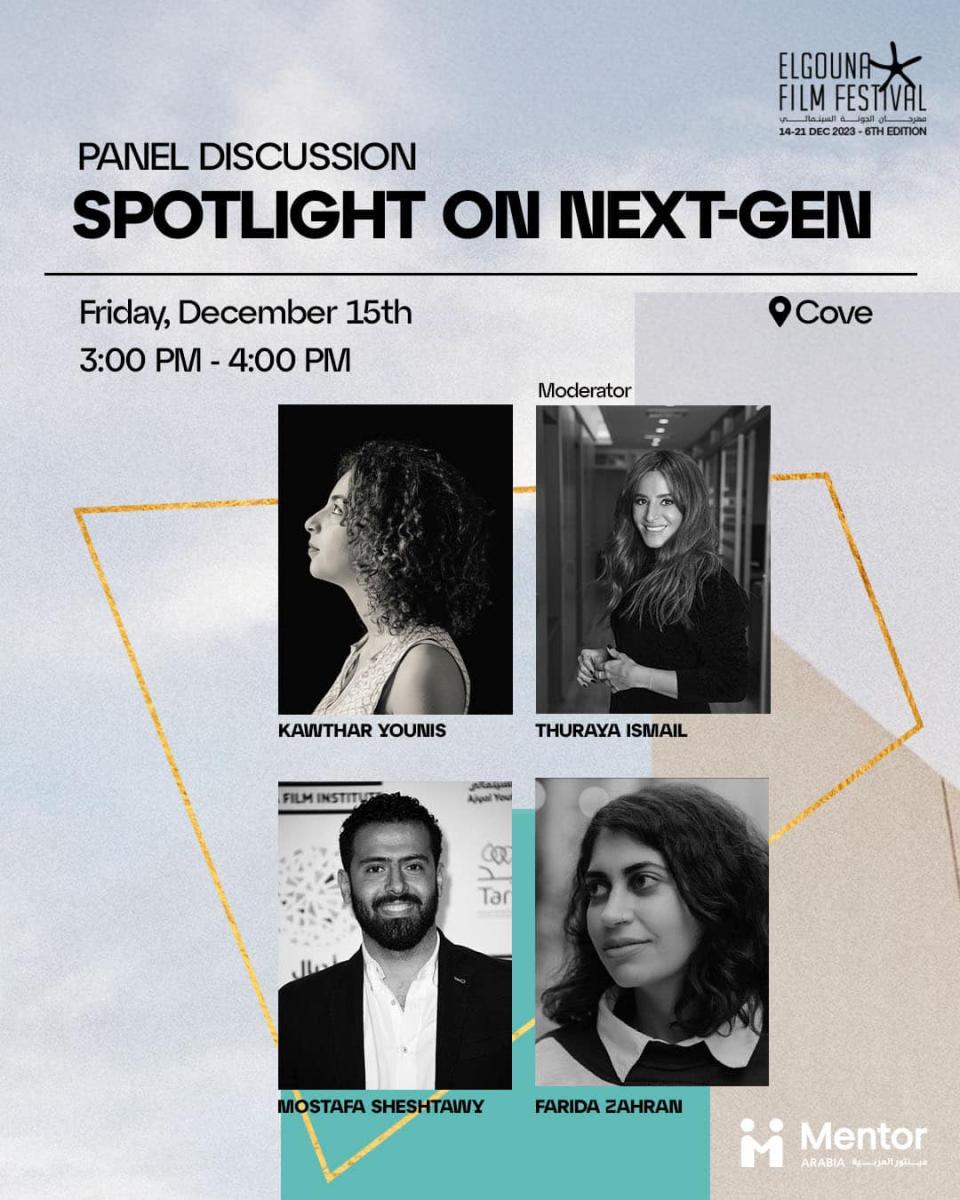The 6th edition of the El Gouna Film Festival (GFF), which took place exceptionally from December 14 to 21, 2023, was marked by a very interesting panel entitled “Full lights on the new generation”.
The speakers, including Egyptian director Kawtar Younes, the director of photography Mostafa Sheshtawy, Lebanese-American director Jude Shehab, and Egyptian screenwriter Farida Zahran, shared their experiences in front of a room full of young enthusiasts.
This panel is located in the objective of the El Gouna film festival, which goes beyond the simple celebration of cinema, aimed at promoting meetings between young talents and established professionals. These enriching exchanges create fruitful professional ties, allowing newcomers to benefit from the wisdom of veterans.
The panelists began with personal presentations, offering an overview of their journey in the film industry. Thuraya Ismail, moderator and expert in human development, directed the discussion by asking questions relevant to the panelists.
Presentation of panelists:
Thuraya Ismail
Mentor Arabia is a subsidiary of mentor and aims to prevent children from any dangerous act or addiction, and through films, we manage to send our voice to children.
Farida Zahran
I am an artist … I hope. I am a screenwriter and director and I am above all a woman.
Kawthar Younis
Director for 14 years as a assistant and then I made my first film which had a huge success and changed my life. I was 22 years old and I did not understand what happened to me. I continued for many years to be assistant because my biggest problem is that I could not find a producer. This is why I then decided to work as a producer, I worked with Netflix. So I had become a professional producer and I liked it because my allowed to work in cinema according to several angles. And that’s what allows you to learn even more.
Mostafa Sheshtawy
Director of photography, I started as a screenwriter and director. When I made my first short film, I understood that it was not what I liked, so I became director of the photographer and that is what I like. I also wanted to become a teacher and I became.
Jude Chehab
I worked as director of photography, but I then made my first short.
Answers to questions asked by Thuraya Ismail
Farida Zahran, as a resident Egyptian in the USA, who is your audience?
In fact, I was raised in Qatar, and I often asked myself this question. I think identity is the same regardless of where we are. Being in New York, it is true that I would be seen by a certain audience, and they are surely waiting for something. I want to tell my stories and the stories of my people and no matter how I am seen. I try to distance it sometimes.
Mostafa Sheshtawy, how did you become director of photography?
In my life, I had several mentors. When I was young, an Egyptian told me that my photos were cinematographic when at the time I was a reporter photographer. She was also the one who brought me my first job as a film photographer. Other people helped me throughout my life, I’m lucky.
Kawthar Younis, who has the person who influenced you the most?
My father is the person who influenced me the most, he taught me to feel, and it is the most important thing and who served me in my job. I am a member of a female association, and we help many people and sponsors new talents.
Jude Shehab, you have collaborated a lot with humanitarian NGOs. What is the difference with the movies you make?
All these experiences learn things. I learned to look at the stories of a certain angle, more humanitarian I think.
Farida Zahran, the soap opera Rummy was a huge success. Why did you do this soap opera and how to explain success?
I will not start a lot of merit, the success of this soap is mainly due to actor Ramy himself. I think it’s just that I found myself in the right place and at the right time. I got to know someone who talked about me to Ramy and asked me to send him my short. They had to do season 2, they asked me. But the discussions lasted two years, and I only started working on this soap opera from season 3.
Mostafa Sheshtawy, you worked on the film Certified mail (2019) which talks about postpartum depression. How did you get this idea?
I worked on this film from the start. I am the photographer. Hisham Saqr, the screenwriter and director is a man who has done a lot of research on this subject. He wanted the whole team to understand this problem and that we could bring this feeling to the public.
Kawthar Younis, your film Sahbety/My friend (2022) was selected at the Venice Festival and won lots of prizes at several other festivals, why?
My films that preceded were films that told personal experiences, the first for example spoke of my father. So I was every time in the film, and it was very tiring emotionally, the process being very difficult because these films were very personal. Then I decided to make a film that does not concern me at all. So I made a film that tells a story of people I don’t know and I was happy not to be concerned by this story. During confinement I have the idea of Sahbety. I asked myself the question: how could a young man go see his friend at home without his parents noticing?
I would never have thought it Sahbety would go to Venice. I also produced the film myself because I did not think that people could finance such a film. It was the editor who proposed to send the film to Venice, I didn’t believe it at all. When he was selected, I thought he would not be in competition. Then I also married this editor who says that the girl in the film looks like me and that she is me.
Jude Shehab, your film Q (2023) is personal and tell your family story.
It is a documentary on my mother and grandmother and their relationship with an Islamist group. I have always felt that doing this film is a responsibility. Among Muslims, there are groups that want to interpret religion as they see fit and impose this interpretation on others. It’s a personal story so I think that in this way there have been more emotions. But I wanted to share this experience, even if to this day, we still have the consequences.
Farida Zahran, your film about sexual harassment Banat Ekher Zaman (2019) has been up to Oscars.
No, it was only qualified for the Oscars. It was the first time that I was shooting in Egypt and I did not know anyone, I wondered what simple story I could tell and that would tell my relationship with the city.
Mostafa Sheshtawy, how the objective of a photographer can send an emotion and an image?
I think what makes me move is the story before the image. Our films are more and more realistic. Sometimes fictions almost become documentaries. The new generation has been used to the fact that the current image is very realistic. For us, a film like Marvel is unreal cinema.
Kawthar Younis, A gift from the past (2016) was your first film. Tell us.
This is the story of my father, to whom I offered a ring so that he could offer it to the woman he loved. We made it a film, which was selected at several festivals, which was successful in the cinema and that is what changed my life.
Enriching exploration of contemporary cinematographic creativity
The diversity of experiences, kinds of films, and themes addressed by the panelists made this panel “full fires on: the new generation” an enriching exploration of contemporary cinematographic creativity. These emerging and confirmed talents not only shared their inspiring stories but also offered precious overviews on the evolution of the film industry.
In short, the panel offered a captivating immersion in creative minds that shape the future of cinema. From personal stories to bright successes, each speaker has brought a unique nuance to discussion, offering a rich look at the flourishing diversity and creativity of the new generation of cinema. The interaction between generations has created an inspiring dynamic, opening horizons for future storytellers of cinematographic stories. The event brilliantly captured passion, perseverance, and innovation that define contemporary film industry.
Neïla Driss









